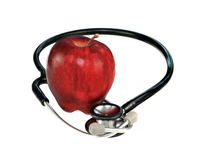During the holidays, people enjoy plenty of special treats, so why shouldn't horses? Holiday treats can provide pleasure and add beneficial nutrients to your horseâs diet. Certainly, everyone enjoys seeing the horse's reaction when offered a special treat. However, too many treats in a short time span can not only affect your horse's health, but can also lead to behavioral problems.

Healthy holiday horse treats
Every horse owner knows that fruits and vegetables make healthy holiday horse treats along with treats made using natural grains and molasses.
Too many treats within a limited time may condition a horse to expect the treats as routine rather than as a once-iin-a-while serendipity. Horses are large animals and can become quite persistent and aggressive when they come to expect treats as routine. In addition, if a horse has a tendency to obesity, higher calorie treats may exacerbate the weight problem, especially if they are given in abundance.
During the holidays many horse owners have visitors including children who like to give horses and other animals treats. Proper supervision is always important when children are around horses, and especially at times when horses may become excited and more aggressive as they reach for expected treats.
Every horse owner knows that fruits and vegetables make healthy horse treats. Also, many recipes using natural grains, molasses, and other ingredients that are healthful for horses are available, as well as some commercially prepared treats.
When using fruits and vegetables such as apples and carrots as treats, remember that they should always be cut into horse friendly pieces to prevent choking or getting lodged in the horse's esophagus. Strips of carrot and slices of apple tend to go down more easily for most horses.
Nutritionally, apples provide your horse with potassium which is important for proper muscle contraction and nerve function. Also, potassium is an electrolyte which is important for cellular metabolism.
Apples also provide calcium and phosphorus which are important for bone growth, muscle and heart function, and milk production. Phosphorus is required for bone structure and energy metabolism. Apples also provide fiber in the equine diet..
Carrots contain vitamin A which is needed for healthy eyes, mucus membranes, skin and hair. During the cold winter months when horses don't have access to green pastures some additional vitamins are good for them.
If you have the time and the inclination for baking some treats for your horse, these muffins made with oats and apples will be most welcome:
Oat and Apple Muffins
Ingredients
- 1 cup of rolled oat cereal
- 1 cup molasses
- 1 cup of wheat bran (small boxes available in baking section of your grocery store)
- ½ cup of brown sugar
- 1 cup freshly grated apples
- About a ½ cup of whole wheat flour and an egg for binding
Preparation
Pre-heat your oven to 300 degrees F. Mix all ingredients. Use a muffin tin and either a small ice cream scoop or a 1/3 cup measuring cup so that you have a consistent amount of batter per treat.
Level the tops off and allow about 30 minutes of bake time, although about 30-45 minutes gives the treats a good crunch level. If not giving to your horse immediately, refrigerate in an air-tight container or zip-lock bag after treats are cooled.
When considering whether to give treats to your horse or not, it is best to consider their intended purpose and role in your horseâs overall health and well being. Many horses are happy with a little extra physical attention. A gentle pat on the neck or a little vocal praise, or in some cases, some extra grooming makes food treats unnecessary.
As long as a horse has a well balanced diet of forage and grain with some mineral supplements when necessary, a few treats can warm the heart of the horse owner and the horse as well when not overdone.
